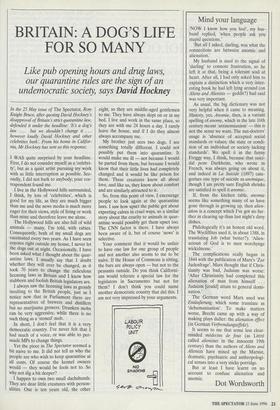Mind your language
`NOW I know how you feel', my hus- band replied, 'when people ask you stupid questions.'
`But all I asked, darling, was what the connections are between anomie and alienation.'
My husband is used to the signal of `darling' to connote frustration, so he left it at that, being a tolerant soul at heart. After all, I had only asked him to explain a distinction which a very inter- esting book he had left lying around (on Aliens and Alienists — geddit?) had said was very important.
As usual, the big dictionary was not very helpful when it came to meaning. History, yes. Anomie, then, is a variant spelling of anomy, which in the late 16th century meant `antinomianism' — this is not the sense we want. The nut-doctors' usage is 'absence of accepted social standards or values; the state or condi- tion of an individual or society lacking standards'. We spell it in the funny Froggy way, I think, because that suici- dal peste Durkheim, who wrote in French, was always going on about it, and indeed in La Suicide (1897) cate- gorises one type of suicide as anomique, though I am pretty sure English shrinks are satisfied to spell it anomic.
If, from the kitchen table, anomie seems like something many of us have gone through in growing up, then alien- ation is a concept which I've got no fur- ther in clearing up than last night's dirty dishes.
Philologically it's an honest old word. The Wycliffites used it, in about 1388, in translating Job (what better?): 'Alien- acioun of God is to men worchynge wickidnesse.'
The complications really began in 1844 with the publication of Marx's `Zur Judenfrage'. Marx thought that if Chris- tianity was bad, Judaism was worse: `After Christianity had completed this alienation of man from himself . . . Judaism [could] attain to general domi- nation.'
The German word Marx used was Entauf3erung, which some translate as `dehumanisation'. To make matters worse, Brecht came up with a way of making plays duller: the alienation effect (in German Vetfremdungseffekt). It seems to me that some less clear- minded medecins de fous (as Littre called alienistes in the innocent 19th century) than the authors of Aliens and Alienists have mixed up the Marxist, dramatic, psychiatric and anthropologi- cal senses into a very sticky porridge.
But at least I have learnt on no account to confuse alienation and anomie.
Dot Wordsworth


































































 Previous page
Previous page